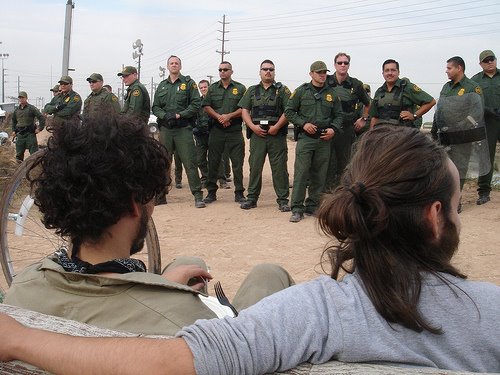By JULIA PRESTON
Published: November 16, 2009
New York Times
Eleventh-hour criticism is arising over President Obama’s nomination for United States attorney in northern Iowa of a prosecutor who had a leading role in the criminal cases against hundreds of illegal immigrants arrested in a May 2008 raid at a meatpacking plant in Postville, Iowa.
Those cases, the broadest use to date of tough criminal charges against immigrants caught working without authorization, were emblems of a crackdown on illegal immigration by the Bush administration.
In supporting the prosecutor, Stephanie Rose, Mr. Obama is following the recommendation of Senator Tom Harkin, the Democrat from Iowa who is an important ally — especially in the health care debate because he is chairman of the Health, Education, Labor and Pensions Committee.
Ms. Rose, a senior assistant United States attorney in the office she has been chosen to run, has also garnered support from criminal defense lawyers in Iowa, including at least 11 lawyers who defended immigrants from Postville. In those proceedings, “she exhibited a level of competence and ability that would be hard to overstate,” the lawyers wrote in a letter in April.
But some defense and immigration lawyers have said that felony identity-theft charges against the immigrants were excessively harsh, that immigration lawyers were not given adequate access to their clients, and that improper contact took place between prosecutors and one judge. They contend that possible civil rights and ethical violations by prosecutors should have been investigated.
“Does she stand by those tactics?” asked David Leopold, the president-elect of the American Immigration Lawyers Association, the national immigration bar. “Would she engage again in this type of prosecution of scores of undocumented workers guilty of nothing more than civil immigration violations?”
The immigration lawyers’ association has not taken an official position on the nomination.
In May, the Supreme Court ruled unanimously that the identity-theft law could not be applied to prosecute immigrants only because they used false Social Security or visa numbers, as it was in many Postville cases.
Ms. Rose’s nomination was unanimously approved by the Judiciary Committee on Nov. 5 and is awaiting a vote by the full Senate.
Ms. Rose declined through a spokesman to comment at this point in the nomination process.
Katherine Bedingfield, a spokeswoman for the White House, said: “As U.S. attorney, Stephanie Rose will be a great advocate for the people of Iowa. The president strongly supports her nomination.”
During 12 years in the northern district, Ms. Rose was the lead prosecutor in more than 200 criminal cases and argued 34 appeals, according to a fact sheet provided by Mr. Harkin.
After the raid at the Agriprocessors kosher meatpacking plant in Postville, 270 immigrants entered guilty pleas and were sentenced in four days of fast-track hearings, in temporary courtrooms in a cattle fairground. According to lawyers who participated, Ms. Rose distributed prepackaged plea agreements and was the principal case manager for the prosecutors.
In an interview, Mr. Harkin vigorously defended Ms. Rose, saying she is “extremely bright and well versed with the law, has a lot of self assurance and a good demeanor for a U.S. attorney.”
In the Postville cases, Mr. Harkin said, officials in Washington made the strategic decisions about what charges to bring and what pleas to offer. “Within the powers she had, she bent over backwards to make sure justice was done,” he said.
But at a hearing before the House Judiciary immigration subcommittee in July 2008, Deborah J. Rhodes, then senior associate deputy attorney general, testified that “all of the charging decisions were made by career prosecutors in the local office.”
James Benzoni, an immigration lawyer in Des Moines whose office has secured visas for two dozen Postville immigrants as victims of exploitation, said, “There was a general failure of due process and common decency.”
“You can’t go forward, you have to clean it up, and she’s not going to do that,” Mr. Benzoni said.
Read @ New York Times: http://www.nytimes.com/2009/11/17/us/17attorney.html

No comments:
Post a Comment